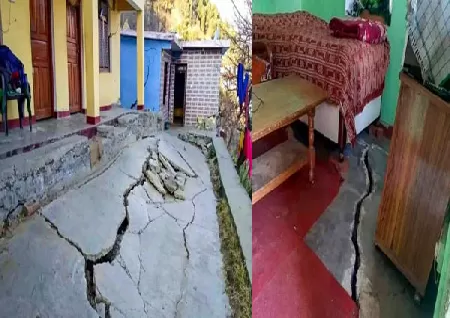Environmentalists demand Hill Regulation Authority PMO refers environment ministry

Hill Regulation Authority is demanded by environmentalists. PMO stands for the Ministry of the Environment.
The law was proposed by an NGO called NatConnect, which also requested that all states examine the harm done to the country's mountains.
Environmentalists in Navi Mumbai are advocating for a Central Hill Regulation Authority that would be akin to the Coastal Regulation Zones in light of the landslides and fissures that have appeared at Joshimath (CRZ). The demand has been forwarded to the Ministry of Environment, Forestry, and Climate Change by the Prime Minister's Office (PMO) (MOEFCC).
The law was proposed by an NGO called NatConnect, which also requested that all states examine the harm done to the country's mountains.
According to NatConnect Foundation director B N Kumar in a letter to President Droupadi Murmu and Prime Minister Narendra Modi, the Joshimath incident is just the tip of an iceberg because widespread destruction of hills in many regions of the country, including the Northeast and the Andaman and Nicobar Islands, can result in many more disasters like the Joshimath.
According to the PMO's report, Rajendra Singh Bora, an undersecretary in the MOEFCC, has been tasked with handling the demand.
In the email, Kumar called attention to numerous landslide incidents in Mumbai and elsewhere, which are nature's warnings against meddling with the hills and hill slopes. The email was also addressed to the chief ministers of Maharashtra, Uttarakhand, and Himachal Pradesh.
The hills appear to be shared by everyone, as NatConnect noted. The revenue agency is concerned with collecting royalties from hill digging or quarrying, the environment department passes the buck, and the forest department permits devastation for infrastructure or housing projects.
Kumar criticises the propensity to disregard environmental concerns as being anti-developmental and urges a careful examination of the effects of infrastructure projects on the environment and the lives of people.
According to NatConnect, city planners like CIDCO allocated 200 plots on Parsik Hill and developed a township in Kharghar Hills in Navi Mumbai. "CIDCO is still determined to restore quarrying in Parsik Hills despite objections from the Navi Mumbai Municipal Corporation (NMMC) and the citizens in general."
The development plan for Kharghar Hill is disturbing, to put it mildly, according to campaigners Jyoti Nadkarni and Nareshchandra Singh. According to Nadkarni, the concept for a nature park that was created in collaboration with BNHS appears to have been approved.
Singh claims that CIDCO confirmed the township's access to the nature park.
How can someone toy with biodiversity while having a sizable residential colony close to a natural park, he questioned.
Invoking a recent incident, Kumar said that the chief minister complained to the forest and environment agencies over the cutting of the Parsik and Kharghar Hills' slopes. However, none of these authorities demonstrated any willingness to intervene.
During the most recent monsoon, the Parsik Hill had a landslide, but the NMMC's water supply monitoring station avoided a catastrophic event, he continued.
According to Parsik Hill Greens forum convenor Vishnu Joshi, "the planning agencies and authorities might think this is a little event, but they are messing with people's lives." How is it that the government authorities do not realise that removing the slope of Parsik Hill, which has hundreds of structures on top of it, would put the lives of the residents and their houses in danger?
As a result of the Human Rights Commission's (HRC) intervention, Jayant Thakur, head of the Parsik Hill Residents Association, declared that justice may now be anticipated. On Thursday, the HRC is scheduled to have its last hearing.
Despite frequent landslides on Mumbai's hills, according to Nandakumar Pawar, executive director of Ekvira Aai Pratishtan, authorities have not halted the expansion of slum colonies. Pawar continued, "Our ministers and officials appear only concerned in lip service at the time of crises and afterwards forget about the tragedy.
Additionally, Kumar and Pawar noted that the planned highway developments in the state's hills might be hazardous. There aren't any prior substantial public hearings or environmental impact assessments (EIAs).
Therefore, they said, it is crucial to establish a "Hill Regulation Authority" with the authority and responsibility to prevent damage and preserve the hills.
Related queries to this article
- Hill Regulation Authority
- Coastal Regulation Zone
- Navi Mumbai Municipal Corporation
Read more articles and stories on InstaSity Latest News.